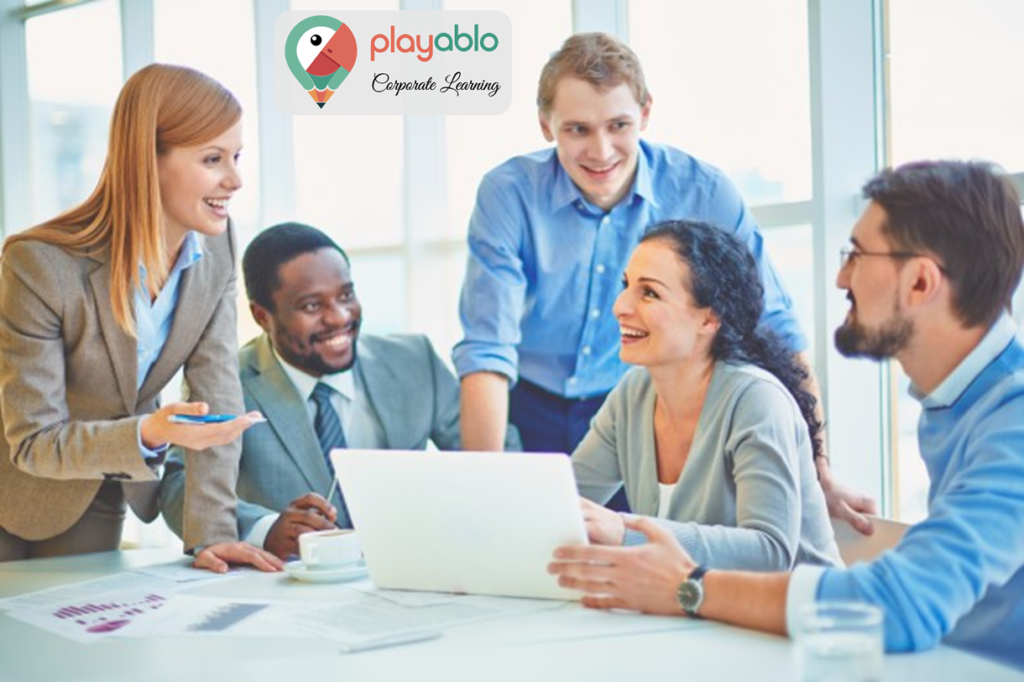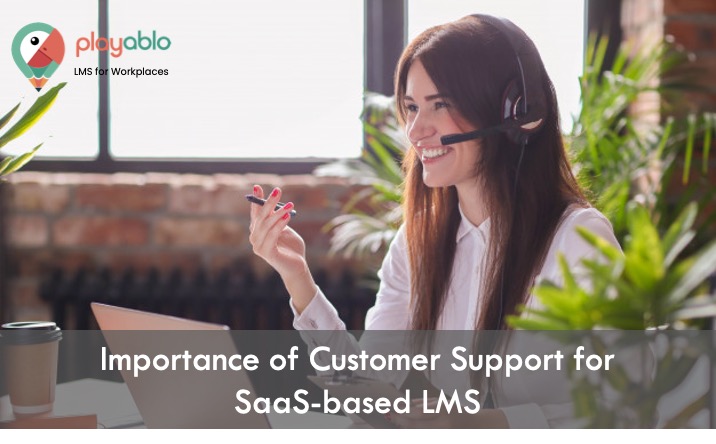“Your customer is going to get to vote and talk. You want them out there as salesmen for you. Customer delight is the main ingredient of success. You will succeed if you have delighted customers. Don’t settle for satisfaction” — Warren Buffett. Yes, customer success is critical. When you are from the SaaS domain, you need to give particular importance to customer- and after-sales services. Let us now get to the details of how customer support is essential for enterprise-level LMS providers.
Table of Contents
Why is Customer Support Important for LMS Users?
Whenever a new customer enrolls for an LMS, it is vital to consider the quality of after-sales services. Why? It’s challenging to master processes like data integration, adding learners, course setup, and advanced reporting functionalities. Mastering these areas needs time — which can range from days to weeks. Even expert LMS admins require guidance when adopting a new solution.
Read More: Role of L&D Managers in Improving Customer Experience

For instance, organizations will need the basic know-how to integrate an LMS with external applications. Additionally, SaaS-based LMS usually comes with a gamut of features. Hence, if there is limited knowledge about a particular aspect, it might stall the entire learning process.
Ad: PlayAblo’s Enterprise-Grade Micro-Learning platform is for the modern corporate learner. Moreover, micro-Learning, along with assessments and gamification features, ensures learning outcome measurement along with sustained engagement.
Find out more and request a custom demo!
Customer Experience and Customer Success
There are many factors to consider whenever customers are looking for a new learning management system. They need to select a solution that satisfies all of their objectives without going over the budget, from reporting features to price ranges. However, one of the most crucial selling elements for LMSs is frequently disregarded: the LMS user experience.
Every other component of the product, including the user interface and overall functionality, is directly impacted by this important factor. Let’s examine the fundamentals of the LMS customer experience and why they are crucial to the LMS purchasing process.
What Is The Customer Experience With An LMS?
Every contact a customer has with the seller and their technology is included in the LMS customer experience and customer success. The LMS customer satisfaction with their brand starts when they click on your homepage or website to investigate a Learning Management System.
Included in this are your responses to their RFP once the client submits it, your interactions with it in the sign-up procedure, and your public support offerings. The LMS user experience typically starts long before a user makes a product purchase. For instance, they may search for reviews online to see what previous customers are saying about your business and products or visit your page on social media to learn more about the software.
However, LMS customer success also considers the client’s perceptions and how the LMS supplier treats its clientele. As a result, each person’s experience will be unique and will mostly depend on their requirements and perceptions. For instance, if your LMS software doesn’t address an organization’s pain issues, the customer experience may be poor or fail to provide the ROI they expected due to a lack of features or support staff.
The Net Promoter Score, aka NPS, is one of the most often used measures of LMS consumer experience. This reveals the likelihood that a user will tell others about your LMS. On a scale of 0 to 10, with 10 being the most likely to recommend, participants are asked: “How likely they are to refer the product to a friend or colleague.” Promoters have a great LMS consumer experience and are happy with the program (scoring 9 or 10).
Customer Service vs. LMS Customer Experience
LMS customer experience and LMS customer service are frequently used synonymously. LMS buyers should take note of the obvious difference between them, though. Customer service can be reduced to the basic services the LMS vendor offers, whereas the LMS customer experience (CX) encompasses every contact or “touchpoint” throughout the customer cycle. For instance, how soon the supplier resolves a payment issue or replies to a difficult report. It is a more specific phrase and only makes up a small part of the overall LMS client experience. LMS customer service is evaluated using a customer satisfaction score rather than a net promoter score.
Customer care is an additional term that is used interchangeably with customer service, customer success, and customer satisfaction. The customer experience mystery now has a new piece. LMS providers who offer outstanding customer service go the extra mile to develop bonds with their clients. They take the time to understand their needs and concerns rather than just providing service.
Superior LMS Customer Experience Examples That Ensure Customer Success

Since there are so many different components that contribute to a customer’s perspective, measuring the LMS customer experience can be challenging. Even feelings are involved. Nevertheless, the following are some excellent illustrations of what a first-rate LMS customer experience looks like in practice at various customer touchpoints:
1. Pre-Purchase (Research Phase)
The customer may easily traverse the LMS vendor’s website and find all the required data to make an informed judgment. Everything, from the selling arguments to the LMS free trial terms, is completely transparent. Visitors can easily get in touch with the provider of the LMS to request additional details or to schedule a consultation. Users can contact the provider or join their lively online community during the LMS trial version or demo to handle any difficulties that come up.
2. Purchase
The process for signing up and downloading is easy and clear. If customers have any concerns along the route, they can contact the toll-free number. They can build the Learning Management System and navigate the process with the support of various online training courses and FAQs. Vendors of LMSs also send a follow-up message or confirmation to the new client, informing them of the support services offered.
3. After Buying
The user experience doesn’t end when a customer hits the buy button. Actually, that is only the beginning. LMS vendors have a sufficient chance to give a favorable CX post-purchase. To continuously improve its product, the company offers everything from individualized support services to asking for consumer input. Customers are urged, for instance, to go to the seller’s social media pages to get updates and useful advice. Additionally, they impart their knowledge on the most recent LMS tool update.
The process of purchasing and implementing an LMS must, in the end, consider the LMS customer experience and, eventually, customer success. The CX directly impacts the ROI of your online training program and the LMS tool’s functionality. If the CX is subpar, you won’t get the assistance required to make the most of the platform.
You might also experience bad customer support, such as slow response times or inadequate knowledge, and be unable to fix programming bugs or login issues. Since the LMS vendor must take an active part in order to optimize the system’s advantages, the LMS customer experience establishes the foundation for the entire LMS deployment process.
Ad: PlayAblo’s Enterprise-Grade Micro-Learning platform is for the modern corporate learner. Moreover, micro-learning, along with assessments and gamification features, ensures learning outcome measurement along with sustained engagement.
Find out more and request a custom demo!
Now that you understand how great LMS experiences appear across the purchase journey, let’s check out some more illustrations at various stages of client interactions:
4. Responsive Technical Support
One exemplary aspect of superior customer experience lies in the responsiveness of technical support. Quick resolution of user queries, coupled with a team of knowledgeable support staff, ensures that users can navigate the LMS seamlessly. This responsiveness not only addresses immediate concerns but also contributes significantly to the overall satisfaction and success of LMS users.
Consider a scenario where a user encounters difficulties in accessing a crucial module just before a critical training session. In this instance, responsive technical support becomes a beacon of assistance.
A support team that acknowledges the issue promptly, communicates effectively, and resolves the issue swiftly ensures that the user’s learning experience remains uninterrupted. This not only instills confidence in the reliability of the LMS but also showcases a commitment to user success.
Insights:
- Building User Trust: Timely support builds trust, assuring users that their concerns are prioritized and addressed promptly.
- Minimizing Downtime: Quick issue resolution minimizes downtime, allowing users to focus on learning objectives rather than grappling with technical hurdles.
- Enhancing User Satisfaction: A responsive support system contributes significantly to user satisfaction, reinforcing the positive perception of the LMS.
5. Personalization in Customer Interactions
Achieving a superior customer experience involves going beyond standard support practices. Personalization in customer interactions emerges as a key factor in creating tailored and meaningful engagements.
Imagine a scenario where a user, eager to enhance specific skills, navigates the LMS. Personalization in customer interactions shines when the system recognizes the user’s preferences and suggests a customized learning path. Whether it’s recommending relevant courses, adjusting module sequences, or providing targeted resources, the LMS becomes a personalized learning companion. This not only saves time for the user but also demonstrates a keen understanding of individual learning needs.
Insights:
- Individualized Learning Experiences: Personalization extends beyond technical support to the very fabric of the learning experience, adapting content to suit the unique preferences and goals of each user.
- Enhancing User Engagement: Tailored interactions increase user engagement, making the learning journey more enjoyable and relevant.
- Empowering User Control: Offering users the ability to personalize their learning paths empowers them with a sense of control, fostering a positive and empowering educational environment.
6. User Training and Onboarding Assistance

Ensuring a superior customer experience extends beyond mere technical support. User training and onboarding assistance play a crucial role in shaping a seamless and empowering learning journey.
Consider a new user navigating through the LMS for the first time. An exemplary onboarding assistance program goes beyond traditional manuals. It might include video tutorials, interactive guides, and personalized onboarding sessions. This comprehensive approach not only familiarizes users with the LMS features but also instills confidence in utilizing the platform effectively from the outset.
Insights:
- Reducing Learning Curve: Robust onboarding assistance reduces the learning curve for users, allowing them to quickly adapt to the LMS functionalities.
- Building User Confidence: Well-structured training programs instill confidence in users, fostering a positive perception of the LMS and its capabilities.
- Ensuring Optimal Feature Utilization: Onboarding assistance ensures that users are aware of and can utilize the full spectrum of features, optimizing their learning experience.
7. Regular Updates and Communication
The importance of a superior customer experience extends to consistent and transparent communication through regular updates.
Consider a scenario where the LMS undergoes an enhancement or introduces new features. Regular updates, communicated clearly through newsletters, in-app notifications, or dedicated communication channels, keep users informed. This not only showcases a commitment to improvement but also allows users to anticipate and leverage new functionalities for an enhanced learning experience.
Insights:
- Fostering User Engagement: Regular updates keep users engaged, demonstrating that the LMS is continuously evolving to meet their needs.
- Setting Expectations: Transparent communication sets clear expectations, ensuring that users are aware of upcoming changes and improvements.
- Showcasing Platform Evolution: Consistent updates communicate the evolution of the LMS, indicating a commitment to staying at the forefront of educational technology.
8. Integration Support
The provision of superior customer experience extends to comprehensive support for seamless integrations.
Consider a scenario where an organization seeks to integrate the LMS with its existing tools and systems. Superior integration support involves a dedicated team that not only understands the technical intricacies but also guides the organization through the process. From initial assessments to post-integration support, this approach ensures that the LMS seamlessly aligns with the organization’s existing infrastructure.
Insights:
- Facilitating Workflow Efficiency: Integration support ensures that the LMS becomes an integral part of the organization’s workflow, enhancing overall efficiency.
- Reducing Implementation Hurdles: A robust support system minimizes challenges during the integration phase, allowing users to leverage the full potential of the LMS without hindrance.
- Optimizing User Experience: Well-supported integrations optimize the user experience by creating a cohesive and interconnected technological environment.
What Are the Issues Faced by SaaS-Based LMS in Offering the Right Customer Services?
Usually, large SaaS-based LMS providers do not have complimentary customer service offerings. Even if they do, they might charge you for that. For them, customer success means additional expenses. They usually concentrate more on other activities like marketing, sales, development, and operations. They provide workforce, stocks, learning management offerings, and resource management software.
Therefore, organizations usually appoint a full-time specialist trained to manage the software and ensure that it works. Such professionals hold expertise in operating, coding, diagnosing, and technical-based problem-solving skills. However, this is not the case with small and mid-scale organizations that cannot spend huge bucks on full-time specialists.
Read More: 5 Strategies for Employee Training in Small Businesses
What Are the Options Available for LMS Users to Ensure Customer Success?

As we already mentioned, organizations can hire a dedicated specialist who is well-versed in managing and operating the software. But even seasoned professionals become baffled whenever there are new updates and changes in the system features. To solve these issues, several LMS providers take the help of third-party solutions and service vendors to ensure customer success. However, such added services come at a cost. Moreover, since there is no direct POC (point of contact) with the LMS provider, the resolution of any query might take a long turnaround time.
Read More: 9 Questions to Ask Your Vendor Before Selecting an LMS
Another alternative is buying additional customer support packages and their regular LMS licensing. Again, this means that vendors need to spend quite a considerable amount when they have multiple years of licensing. And finally, these charges will add up to the final fee payable by the customer. Therefore, the final solution is to pick a platform that offers free customer support. Such services are usually provided by LMS providers whose primary product is eLearning software. They will generally not charge anything extra to ensure customer success.
Such services are economically sound for a smaller organization, not to forget that most LMSs developed by eLearning experts are built keeping L&D skills in mind. Hence, the need for coding or technical background is non-existent.
How Does PlayAblo Ensure Customer Success?
When you seek the services of a platform like PlayAblo, you get dedicated customer support at no extra cost — from pilot to deployment to implementation to training and handholding. We have a single point of contact (SPOC) who serves as the face of the organization. The communication is pretty seamless, and turnaround times to solve queries are extremely fast. The experts at PlayAblo will also handhold you through all stages of the learning lifecycle — such as training, demo sessions, and full-fledged pilot trials.
Conclusion
As stated earlier, PlayAblo is a comprehensive SaaS-based LMS, which comes embedded with all the elements to ensure customer success. If you have any further questions, you can always contact our team. We are just a call away!
Ad: PlayAblo’s Enterprise-Grade Micro-Learning platform is for the modern corporate learner. Moreover, micro-Learning, along with assessments and gamification features, ensures learning outcome measurement along with sustained engagement.
Find out more and request a custom demo!







Comments are closed, but trackbacks and pingbacks are open.